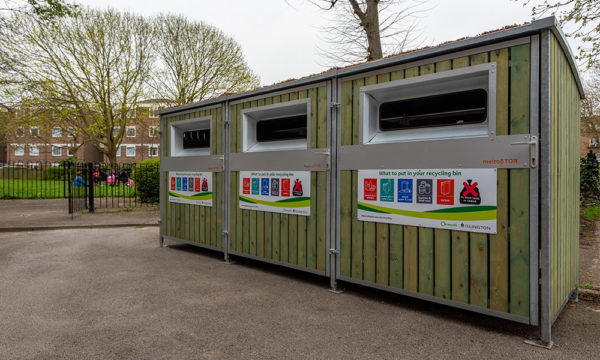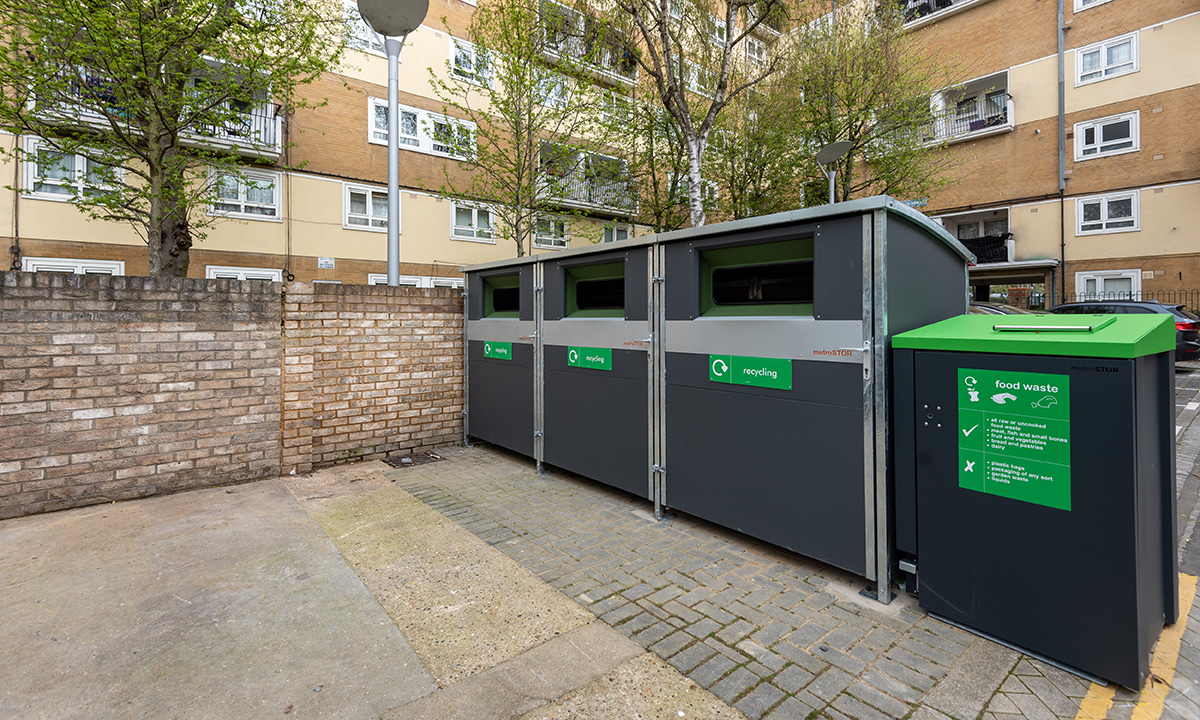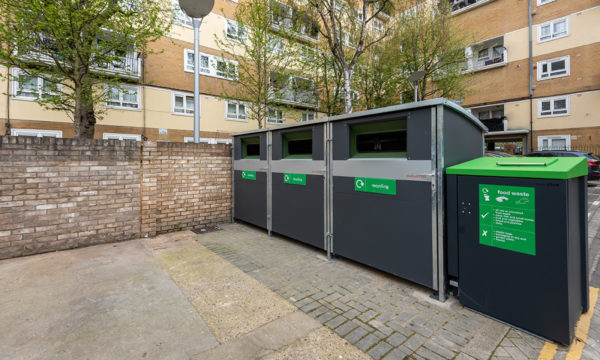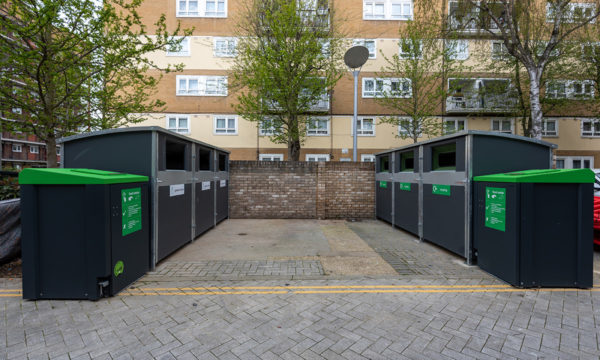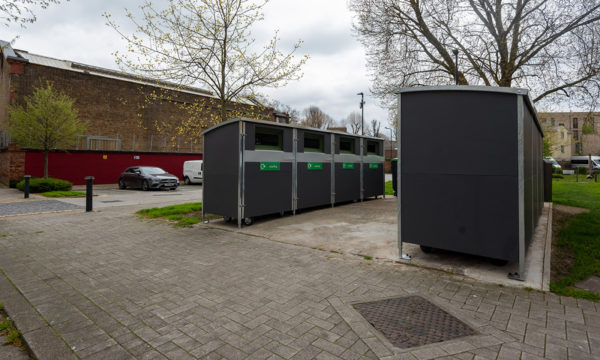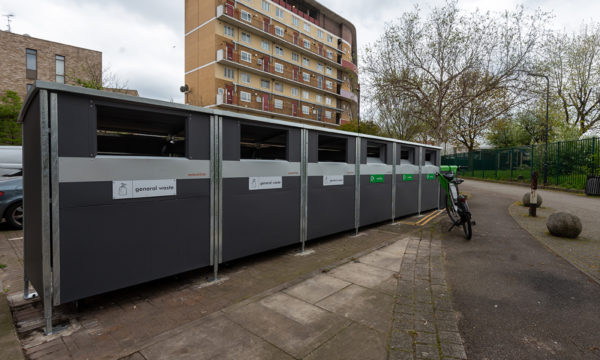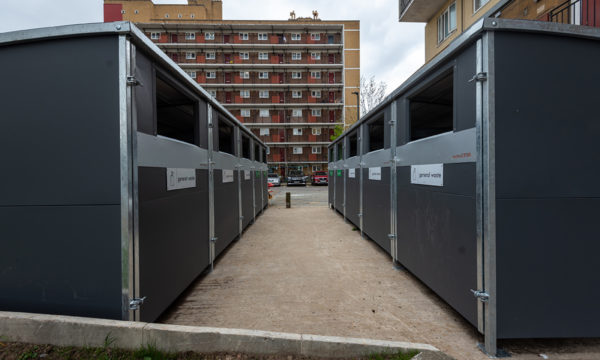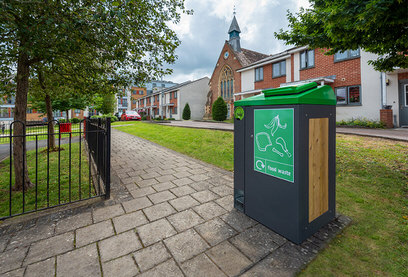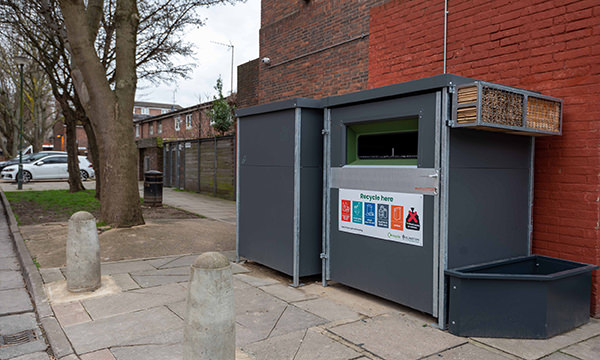Case Study Highlights
| Project | South Kilburn Estate |
| Client | Brent Council |
| Scope | metroSTOR PBMT Bin Storage Housing 4 Bin Storage Housing |
| metroSTOR FX Food Waste Bin Housing |
South Kilburn is a large housing estate in the London Borough of Brent. The estate is typical of the post-war modernist architecture of public and social housing that emerged in mid- 20th century Britain, and is largely distinguished by concrete-formed high-density housing in low-rise flats and high-rise tower blocks.
On behalf of Brent Council, the estate has been enveloped in a large-scale housing development by Alison Brooks Architects since 2014, characterised as a 15-year regeneration project. The estate has long-since suffered from exposure to gang-related crime and the Council envisions the programme as a driver for change, encouraging the area to transform into a sustainable, dynamic neighbourhood that will nurture community pride and a strong sense of place for residents. With a focus on social diversity, 2000 new homes under social and private ownership are planned for integration by the project’s end, alongside enhanced community facilities and more substantial open, green space.
During this time, metroSTOR has worked closely with Brent Council to deliver wide-spread waste & recycling facilities in several locations across the Borough. To date, metroSTOR have implemented 45 Bin Storage Housings, utilising variations on the versatile metroSTOR PBM range. Brent was one of many London Boroughs to take action towards fighting climate change, with many of London’s Local authorities developing their own Reduction and Recycling Plans, setting out key measures for cutting waste and improving recycling; forming an integral aspect of London’s city-wide targets to cut food waste by 50% per person and achieve 65% municipal waste recycling by the year 2030.
Contained within Brent Council’s Climate and Ecological Emergency Delivery Plan was a scheme to improve waste and recycling collection and infrastructure across the Borough, particularly for residents in the borough living in communal environments. Over 50% of Brent’s residents live in flatted accommodation, with this figure set to continue to rise. At the heart of their efforts is a plan to develop a Borough-wide, Brent Environmental Network.
In order to engage further resident participation in recycling and appropriate waste disposal, metroSTOR worked closely with Brent Council, undertaking an assessment of the estate with a view towards developing a comprehensive plan for enhancing the sustainability of the waste management system. The previous communal bin stores contained overflowing bins that were often exposed to contamination, creating an uninviting environment in need of a refresh. As a short-term measure, Brent Council had introduced a second weekly collection to attempt to manage the number of missed collections taking place, as well reducing the accumulation of side waste.
Presenting metroSTOR’s longer-term solution to residents as part of a full consultation, Brent Council engaged the local community to offer feedback through virtual Q&A sessions and an online survey. Following the consultation, a review of the feedback demonstrated that the majority of residents were keen to move forward with the improvement suggestions, enabling metroSTOR to proceed with the proposed project solution. This would see the implementation of waste & recycling units and food waste bins in varying capacities placed in prominent and accessible locations across the estate, including Alpha House, Canterbury House and Gorefield House.
All site installations were preceded by associated groundworks, including the laying of foundation pads and the removal of a pre-existing timber store at Gorefield House and removal of brickwork at Alpha House. Works at Canterbury House involved lowering the site’s foundations to match the road level and accommodate the new units.
10no. metroSTOR PBMT Bin Storage Housings will be provided across the estate upon project completion, utilising user-friendly apertures and clear signage at the front of the units to separate resident waste into a mix of general and recyclable. The metroSTOR PBMT incorporates the Taylor Continental 1100L bin, which offers a reduced footprint and is highly advantageous in urban locations with restrictions on space.
Providing amenities to help deliver Brent Council’s Climate and Ecological Emergency Delivery Plan, the bin stores were supplemented with the addition of 9no. metroSTOR FX 240 Food Waste Bin Housings. Findings from WRAP estimated that the UK wastes 9.5m tonnes of food wasted every year, equating to a projected annual value of over £19 billion and contributing to more than 25m tonnes of greenhouse gas emissions. In response, the UK Government has committed to halving the UK’s food waste emissions by 2030. Encompassing these efforts is a £15m scheme to address surplus food waste from the food, retail and manufacturing sectors, in addition to impending plans to implement separate food waste collection across the UK from 2023.
The metroSTOR FX has been designed specifically to help tackle this problem and assist local authorities with their collections, providing an effective solution for high-density housing where individual waste caddies are not a feasible option. Designed with a foot-pedal operated lid system, the unit enables touch free access, negating any need for the bin lid to be handled. This is a common drawback of food waste bins that can ultimately discourage use, while the closing lid also ensures the food waste container is enclosed, restricting the odours and undesirable side effects emitted by food degradation.
